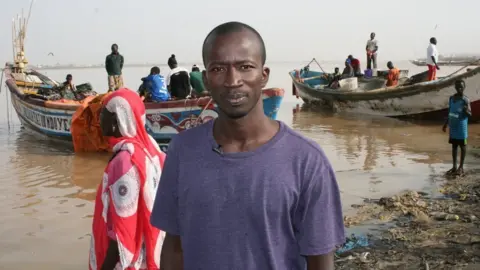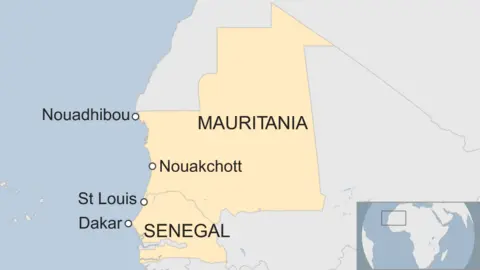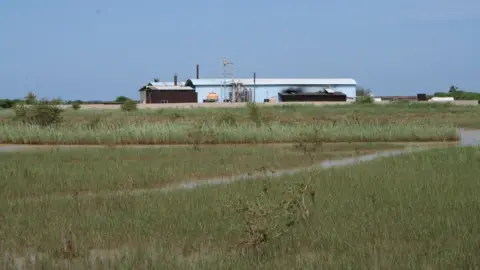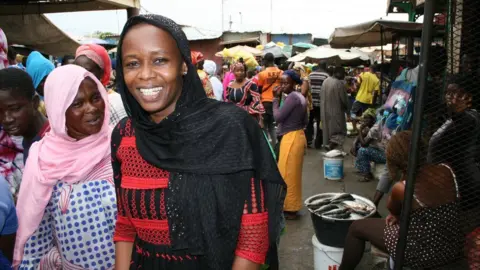'Fish are vanishing' - Senegal's devastated coastline
 BBC
BBCForeign trawlers and an expanding fishmeal industry are increasingly threatening the livelihood of Senegalese fishermen, forcing many to migrate to Europe, writes the BBC's Alfonso Daniels.
Mor Ndiaye, 34, has lived all his life in St Louis, a bustling fishing town in northern Senegal. Its sandy streets are crammed with children and roaming goats. Life here was good until a few years ago when everything changed.
"The fish just vanished, what can we do? We used to catch enough fish in a day or two. Now we need to go out at sea for weeks to catch the same amount. It's terrifying, we can only rely on God," he says, standing next to men carrying fish in large plastic crates over their heads from the few traditional wooden boats arriving ashore.
St Louis, a former French West African colonial capital, lies at the heart of one of the world's richest fishing areas.
Fish caught here - mainly sardinella and other so-called pelagic or open sea fish migrating up and down the coast - have provided up to 75% of the protein consumed by millions of people in Senegal and across Africa's interior in countries like Burkina Faso and Mali.
'Soaring fish prices'
But decades of mainly European and Asian trawlers scouring its coastline have meant that its waters have been overfished.
As fish run out, artisanal fishermen are building larger boats to go further out to sea, making overfishing even worse.
Others have decided to migrate to Europe. They include Amadou Dieye, 28, who tried to get to Spain last August but gave up after spending several days drifting at sea when the boat's engine broke down.
"There were more than 100 people in the boat. Everyone was getting ill. It was terrible," he explains, while standing near the beach.
"Every year there are less and less fish. Many young fishermen like me who don't have families want to migrate, but I won't try it again. I saw things I never want to experience again."
Less fish has also meant that the price of this once-cheap staple has increased. At the local fish market, dozens of women are busily selling sardinella amid the searing heat, but the frantic activity belies a different reality.
"A few years ago you used to buy three sardinellas for 100 CFA francs ($0.20; £0.16), but now it costs 400 or 500 CFA francs," buyer Hadi Khadiata Diop, 30, says.
"Our national dish is thieboudienne: rice with fish. We cannot live without fish. I don't know what we're going to do."

As it became harder to catch fish in Senegalese waters, fishermen increasingly depended on catching fish in Mauritanian waters.
But two years ago, the Mauritanians put a stop to this, causing the catches of fishermen from St Louis to plummet by 80%.
Still, many fishermen keep crossing into Mauritania illegally, even if it means risking their lives.
Earlier this year, Fallou Diakhaté, 19, was killed by the Mauritanian coastguard, sparking riots and the looting of shops owned by Mauritanian immigrants.
'I'm scared'
His mother, Fatou Ndiaye, learnt about his death at the protests. She now lives in a small rented room in a dilapidated two-storey building with her three small children in Guet Ndar, a thin peninsula between the Atlantic and the mainland colonial centre of St Louis, where most fishermen live.
"Fallou maintained the family. I got divorced and my new husband is ill, so now I have to work in any job I find," she tells me.
She scrapes a living selling clothes at a market, but this is often not enough.

"I'm scared: everything I earn goes to feed my children but sometimes I don't have enough to even give them breakfast. I want them to have an education, I'll never allow them to become fishermen, whatever it takes."
There are reports of dozens of fishermen having been killed, although no-one knows the exact number.
If they are caught, the Mauritanian coastguard confiscate their boats and equipment, dropping them off on shore to make their way back to Senegal on foot.
Mauritania says it is trying to protect its own fish but it recently agreed to let the Senegalese catch 50,000 tonnes with 400 boats every year, in a quest to improve relations with its neighbour.
However, this agreement is yet to be implemented, and it represents only a small number as there are thousands of boats in St Louis alone.
China's hunger for fishmeal
After months of trying, I got a permit to cross into Mauritania, travelling hundreds of kilometres across the desert and arriving at Nouadhibou in the north, Mauritania's only fishing port.
It was a striking sight: thousands of fish being turned into dust to create fishmeal - a kind of powdered protein used for animal feed, exported mainly to China to feed other fish and livestock.
Last year, almost half of Mauritania's fish catch was processed into fishmeal, according to the government.

This is a hungry industry, with 5kg (11lb) of fish required to produce just 1kg of fishmeal. There are already some 20 plants in Nouadhibou alone. But critics say this industry is creating very few jobs.
"The Senegalese were replaced with mainly Chinese and Turks who now catch the fish being processed by fishmeal plants, mostly owned by the Chinese and Russians," Alassane Samba, a former director of Senegal's oceanic research institute, tells me.
"Mauritania is protecting its waters not for its people, but for foreigners."
He adds that despite the lack of fish, there are around 15 fishmeal plants in Senegal also, including one in St Louis. Some are being built further down the West African coast as far away as The Gambia.

Read more:

Making matters worse, some foreign trawlers feeding these fishmeal plants are accused of fishing illegally.
"Chinese and other foreign trawlers sometimes catch small prohibited fish or operate in protected areas," Henoune Ould Hamada, a former fisheries inspector, tells me.
"We even found evidence of them using dynamite to catch fish," he adds, referring to the practice of using explosives to blast thousands of fish to the surface.
Mr Hamada says he and many other inspectors lost their jobs and were replaced by a quasi-military inspection team. He believes this is because they refused to turn a blind eye to illegal activities.

This is despite Mauritania priding itself as a leading campaigner against corruption in the fisheries sector globally.
In January 2015, President Mohamed Ould Abdel Aziz set up the Fisheries Transparency Initiative, and urged other governments to sign up to it.
Mr Hamada says that when trawlers were fined for illegal fishing, the upper echelons of the now-disbanded inspectorate took a percentage.
This happened between 2005 and 2010, when the inspectorate was led by Cheikh Ould Baya, he adds.
Mr Baya, now the president of the National Assembly and one of the richest men in Mauritania, said five years ago that 48% of all fines was kept for the benefit of the whole team, and said that this was legal.

You may also be interested in:

This is disputed by Mr Hamada, who says he and other inspectors never received anything.
I contacted Mr Baya's office for comment but did not receive a response, while a Mauritanian fisheries representative confirmed that the law had then allowed officials in the inspectorate to take 48% of fines. The law was scrapped soon after Mr Baya left the inspectorate office.
Back at the shore, traditional Mauritanian fishermen, who are supposed to benefit from the restrictions imposed on Senegalese fishermen, are also complaining about the lack of fish.
"Before you used to catch lots of fish in a single day, but now it's very hard to find anything because the large trawlers are catching everything," says fisherman Abdullahi Bahry, standing in the beach, with endless rows of fishmeal factories stretching behind him.
"Things are terrible. Unless we do something, the blue sea will turn black, we will run out of fish."
